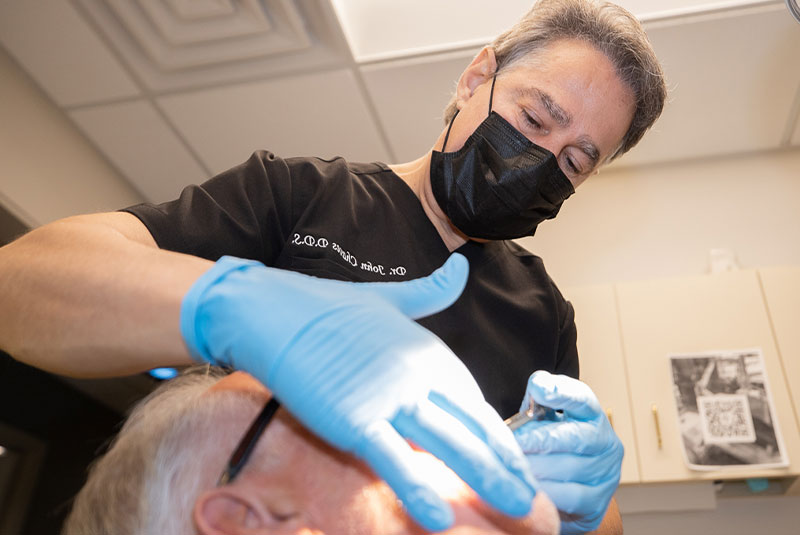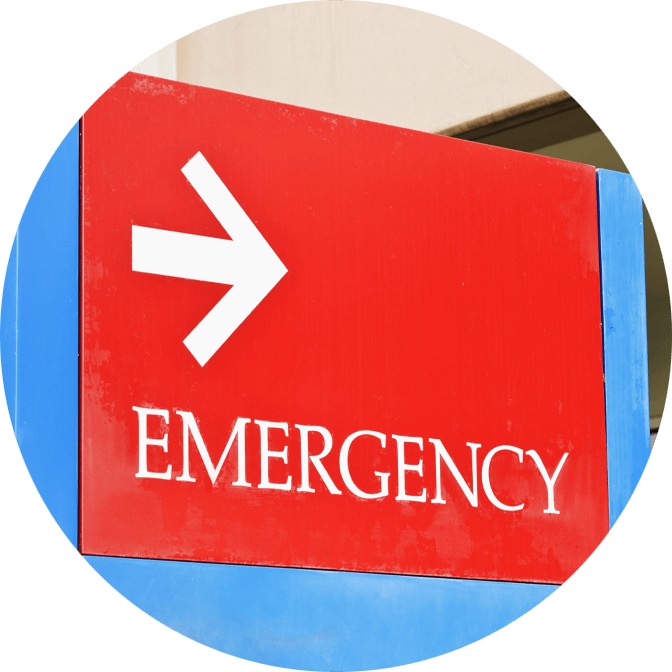

While wisdom teeth can be beneficial if they emerge properly and align with the rest of your teeth, they often lead to complications that necessitate emergency dentistry services. Understanding the complexities surrounding wisdom teeth is crucial for maintaining excellent oral health and preventing potential dental emergencies.
Our emergency dentist in Woodland Hills wants patients to understand when wisdom teeth pain is considered an emergency dental situation. See how we’re dedicated to serving patients in Woodland Hills with the best possible care and call 818-491-7294 to schedule an emergency appointment with Dr. John Chaves.
If you require an emergency dentist near you in Woodland Hills, CA, our team is here to promptly relieve your pain and restore your oral health.

Wisdom teeth, scientifically known as third molars, are the last teeth to develop in the back of the mouth. These teeth typically emerge during the late teens or early twenties.
Most people have four wisdom teeth — two in the upper jaw and two in the lower jaw. However, some individuals may have fewer or even none at all. The development of wisdom teeth can vary from person to person, and while some may experience a smooth eruption, others may encounter complications.
Recognizing the signs of wisdom teeth emergencies can help you seek prompt dental care. Look out for the following symptoms:
If you experience these symptoms, contact our Woodland Hills emergency dentist immediately to prevent further complications. You may need an emergency wisdom tooth removal.

We offer several types of sedation to alleviate dental anxiety and ensure your ultimate comfort.
When a wisdom tooth doesn’t fully emerge from the gum line or remains trapped in the jawbone, it’s considered impacted. This condition can lead to swelling, pain, and an increased risk of infection.
Pericoronitis is the inflammation of the gum tissue surrounding a partially erupted wisdom tooth. It can cause severe pain, difficulty opening the mouth, and an unpleasant taste in the mouth due to the accumulation of debris and bacteria.
Wisdom teeth are challenging to clean properly, making them more susceptible to tooth decay. When decay reaches the inner pulp of the tooth, it can cause intense pain and may necessitate emergency dental treatment.
Infected wisdom teeth can lead to swelling, pain, and even fever. In severe cases, the infection can spread to other parts of the head and neck, requiring immediate attention. Your dentist may recommend an emergency wisdom tooth extraction.
Impacted wisdom teeth can lead to cysts or tumors in the jawbone, causing pain and potential damage to surrounding teeth and bone.
When facing a dental emergency related to wisdom teeth, it’s natural to feel anxious about the treatment process. Understanding what to expect during an emergency dental visit can help ease your worries.
Follow-Up Care: After emergency treatment, your dentist will provide detailed instructions for post-treatment care. Following these guidelines will promote faster healing and prevent complications.

While not all wisdom teeth problems can be avoided, there are preventive steps you can take to reduce the likelihood of emergencies:
Wisdom Teeth Removal: If your dentist recommends removing your wisdom teeth proactively, seriously consider the option, especially if there’s not enough room for them to emerge correctly.
Wisdom tooth pain can be a dental emergency, especially if it’s severe and accompanied by other symptoms. In some cases, wisdom teeth can become impacted or grow at an awkward angle, leading to intense pain and discomfort.
A wisdom tooth infection can become an emergency if it causes severe pain, swelling, or fever. Infections can spread rapidly and lead to serious complications, affecting nearby teeth and jawbone. If you suspect a wisdom tooth infection or experience any signs of swelling, persistent pain, or fever, don’t delay seeking emergency dental care.
In most cases, impacted wisdom teeth are best addressed by an oral surgeon or a dentist with expertise in surgical extractions. While hospitals may have dental departments, they can handle more critical medical emergencies rather than routine dental issues. If you have an impacted wisdom tooth that requires attention, contact an experienced dentist or oral surgeon who can provide specialized treatment.
Dealing with wisdom teeth can be both challenging and painful, but armed with the knowledge we’ve shared in this article, you can navigate potential emergencies and take proactive steps to maintain optimal dental health.
Don’t hesitate to reach out to our Woodland Hills dental practice for personalized advice and treatment options tailored to your specific needs. Call 818-491-7294 to learn more and schedule a consultation.
I understand the information disclosed in this form may be subject to re-disclosure and may no longer be protected by HIPAA privacy regulations and the HITECH Act.
